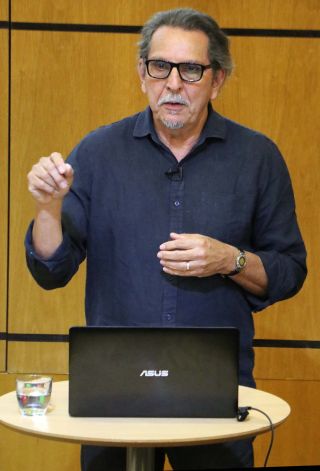Environment
Environmental Psychology for a Better Future
Glenn Albrecht shifts us from environmental distress to positive action.
Posted August 8, 2023 Reviewed by Abigail Fagan
Key points
- "Solastalgia," a term coined by Glenn Albrecht, refers to psychological distress from nature changing.
- Albrecht aims to harmoniously re-integrate humans and nature.
- The "Symbiocene" asks us to govern ourselves and the planet for mutual gain.

Environmental psychology is busy these days, addressing the major environmental and social changes we are all experiencing. From human-caused climate change to the COVID-19 pandemic, from anti-science crusades to deteriorating mental health, understanding hate and disinformation helps us to counter negativity and formulate positive action.
Glenn Albrecht has been at the forefront of this work for decades. Variously described as an environmental philosopher, ecophilosopher, environmental psychologist, ecopsychologist, sustainability expert, and environmentalist, he has melded disciplines through pioneering the field of psychoterratic conditions, referring to Earth-related mental health and wellbeing.
Philosophy and Action
His background and work are mainly philosophical, having followed an academic career, yet never neglecting policy advice and practical implications. He retired in 2014 from his role as Professor of Sustainability at Murdoch University, Australia. Other affiliations, also in Australia, have included the University of Newcastle and the University of Sydney.
He has had to prepare to fight fires on his property. In December 2019, a wildland fire started inadvertently by a neighbour swept toward his farm in New South Wales. His wife evacuated with a few bags of possessions, as he stayed behind attempting to stop their property from burning. Helicopters swept in and saved the day by dropping water, stopping the flames 1.5 km from their house.
Wildland fires are typical in the environment and many ecosystems require them to survive, in Australia and in many other places around the world. The speed and extent of human-caused environmental changes at the moment are not typical. Groundwater drawdown, mining, human-caused climate change, deforestation, whaling, and fishing exemplify the changes we have wrought across our planet’s waters, lands, and atmosphere—all affecting the living and non-living components of ecosystems.
Local knowledge is becoming outdated, land-based peoples are being evicted from their homes, and cultures that have developed with the Earth are separated from it. Many indigenous peoples are forced to move or change livelihoods, such as due to logging, or the local ecosystems have undergone massive alterations, such as from dams. Adverse mental health and wellbeing impacts are increasingly prevalent.
New Terms for Changes
Through witnessing and documenting these changes, Albrecht coined the neologism “solastalgia”: psychological distress, pain, and negative mental health impacts from the lived experience of changes to the home environment. When our anchor in head and heart is the environment and it suddenly transforms, then anxiety, grief, fear, and hopelessness can overtake our emotions and lives. Mental health and wellbeing suffers, often in contexts where it is stigmatised.
Albrecht’s contributions to identify and redress these difficulties are steeped in his foundational approaches for understanding complexity and linking disciplines so that health improves. Despite his job title and people labelling his expertise, he has never felt confined by academic boundaries. In fact, one of his key books is Health Social Science: A Transdisciplinary and Complexity Perspective (Oxford University Press, 2001). Co-authored with Nick Higginbotham and Linda Connor, it breaks ground by developing a framework for combining quantitative and qualitative approaches for comprehending and resolving many human health problems.
The resolutions, overcoming complex challenges and using many disciplines, led to his interest in flipping around the despair and loss of solace embodied by solastalgia into practical, positive actions. The “Symbiocene”, another of his concepts, covers humanity living symbiotically with the environment to achieve mutual benefit. From the same root as “symbiosis”, and similarly embracing “companionship”, Albrecht explores “Earth emotions”, hoping that we feel them too and so can align positive feelings with positive responses from ourselves and our planet.
Countering doomerism’s debilitating negativity through eco-inspiration (symbio-inspiration) has galvanised him to produce other positive psychoterratic concepts, including:
- Endemophilia: Loving the unique attributes of the place where we live.
- Eutierria: Positive feelings from linking life forces of people and the planet.
- Soliphilia: Love of the political wholeness connecting people, the environment, and the Earth.
To some extent, although not entirely, we can create our state of mind, just as we can influence the state of the planet. Currently, neither is going particularly well, yet many options exist for improvement and have been put into practice. From stopping the release of chemicals that deplete stratospheric ozone to banning many ruinous pesticides, from urban gardening to averting lethal flood disasters, we have achieved many local and global successes. They support our mental health and wellbeing.
Albrecht does not dismiss the barriers, instead seeking productive and effective ways forward together. This environmental psychology and environmental philosophy can contribute to building a better future, if we choose to let them do so.
References
Albrecht, G.A. 2005. ‘Solastalgia’. A New Concept in Health and Identity. PAN: Philosophy Activism Nature, no. 3, pp. 41-55.
Albrecht, G.A. 2019. Earth Emotions: New Words for a New World. Cornell University Press, Ithaca, NY.
Albrecht, G.A. 2020. Negating Solastalgia: An Emotional Revolution from the Anthropocene to the Symbiocene. American Imago, vol. 77, no. 1, pp. 9-30.
Albrecht, G.A. 2020. The extinction of rights and the extantion of ghehds. Griffith Law Review, vol. 29, no. 4, pp. 513-533.




